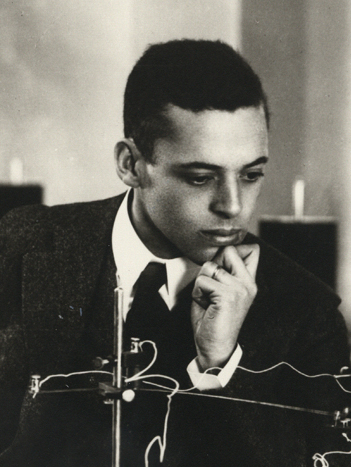Ernest E. Just
(1883 - 1941)
Marine Biologist

Ernest E. Just, Scurlock Studio Records, Archives Center, National Museum of American History, Smithsonian Institution
Ernest E. Just, a zoologist who specialized in cytology (the study of the cell), is best know for his contributions to marine biology. While on the faculty of Howard University, he spent summers as a researcher at the Marine Biological Laboratory at Woods Hole, Massachusetts, where he did significant research on the fertilization of eggs of marine mammals. His studies of fertilization and of the fundamental role of the cell surface in the development of organisms won international acclaim.
Dr. Just was born in Charleston, South Carolina, in 1883. After his father’s death in 1887, Just’s widowed mother supported the family by teaching. At age 17, Ernest Just left home to pursue better educational opportunities in the North. He won a scholarship to Kimball Union Academy in Vermont, where he was the only black student, and went on to Dartmouth, where he was the only student in his class of 1907 to graduate magna cum laude. He majored in biology and history, winning honors in both.
Upon graduation, he accepted a teaching position at Howard University in Washington, D.C. There he headed the Department of Zoology and later, the Department of Physiology at Howard’s College of Medicine. Beginning in 1909, he spent summers as a research assistant to Dr. Frank Lillie, director of the Marine Biological Laboratory. It was there that Just began his lifelong study of marine eggs.
In 1915, in recognition of his outstanding work in science, Ernest Just became the first recipient of the prestigious Spingarn Medal of the NAACP. In 1916, the University of Chicago awarded him a Ph.D. in experimental embryology.
Dr. Just continued to teach at Howard University and to spend summers doing research at Woods Hole through 1929. During that period, he published a number of scientific articles that established his reputation in his field. He was elected to several professional societies, including the American Association for the Advancement of Science, the American Society of Zoologists, and the American Ecological Society.
Despite his professional achievements, Dr. Just felt the humiliation and the limitations imposed by racism at the Marine Biological Laboratory. After he received a large, five-year grant from the Rosenwald Foundation in 1928, Dr. Just left for Italy, where he continued his research at an institute in Naples and began to develop strong relationships with European scientists.
In the following decade, Dr. Just made a number of extended trips to Europe to conduct research at the Kaiser Wilhelm Institut in Berlin, Germany, and later at a biology institute in France. He and his second wife, a German biologist, fled France in 1939 after being interned in a prison camp by the Nazis. Dr. Just, his health failing, returned to teaching at Howard University in 1940. He died of pancreatic cancer in October 1941.




